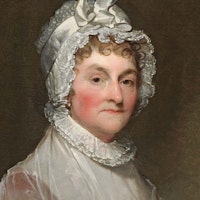Call Out Great Virtues
Topic: Virtue, Morality, & Ethics
These are the times in which genius would wish to live. It is not in the still calm life or the repose of a pacific station that great characters are formed. The habits of a vigorous mind are formed in contending with difficulties. Great necessities call out great virtues. When a mind is raised and animated by scenes that engage the heart, then those qualities which would otherwise lay dormant wake into life and form the character of the hero and the statesman.
Abigail Adams (née Smith; November 22, [O.S. November 11] 1744 – October 28, 1818) was the closest advisor and wife of John Adams, as well as the mother of John Quincy Adams. She is sometimes considered to have been a Founder of the United States, and is now designated as the second First Lady of the United States.
Letter to [son] John Quincy Adams
McCullough, David. “Knowing History and Knowing Who We Are.” Imprimis, 20 Apr. 2017, imprimis.hillsdale.edu/knowing-history-and-knowing-who-we-are/, p. 6 [Abigail Adams, Letter to her young son John Quincy Adams].

Abigail Adams
Theme: Virtue Is


About This Abigail Adams’ Quotation [Commentary]
In a letter to her young son John Quincy Adams, Abigail Adams wrote, “Great necessities call out great virtues.” She did not speak from comfort but from experience shaped by difficulty and public uncertainty. In her words, “It is not in the still calm life or the repose of a pacific station that great characters are formed.” Character, for Adams, is drawn out by challenge and need. The pressing demands of difficult times do not simply reveal virtue—they awaken it. “Great necessities” summon a response, calling forth qualities that might otherwise remain unused.
She continues, “The habits of a vigorous mind are formed in contending with difficulties.” Virtue, then, emerges through practice, not ease. The mind becomes steady by engaging with hardship. But Adams does not separate intellect from feeling. In her final sentence, she writes, “When a mind is raised and animated by scenes that engage the heart, then those qualities which would otherwise lay dormant wake into life.” This combination—thought lifted, heart engaged—gives rise to the traits she names as forming “the character of the hero and the statesman.” For Adams, virtue is not passive. It is called into life when the whole person is involved.
What stands out is the seriousness with which Abigail Adams addresses a child. She speaks directly to his capacity, presuming readiness. “These are the times in which genius would wish to live,” she writes, not because they are easy, but because they demand something real. Her language reflects a belief that the soul rises when called, that great circumstances do not overwhelm but summon. In this light, virtue is not merely a private ideal but an active response—called out by necessity and sustained by the mind and heart together.
David McCullough About the Abigail Adams Letter [Commentary]
“And here is what [Abigail Adams] wrote to him [her son, John Quincy Adams]… Now keep in mind that this is being written to a little kid and listen to how different it is from how we talk to our children in our time. She’s talking as if to a grown up. She’s talking to someone whom they want to bring along quickly because there’s work to do and survival is essential: [see quote in Context above].
Now, there are several interesting things going on in that letter. For all the times she mentions the mind, in the last sentence she says, “When a mind is raised and animated by scenes that engage the heart, then those qualities which would otherwise lay dormant wake into life and form the character of the hero and the statesman.” In other words, the mind itself isn’t enough. You have to have the heart.”
–David McCullough, Historian [Knowing History and Knowing Who We Are, Imprimis (April 2005)]
Resources
Related Quotes
Copyright © 2017 – 2025 LuminaryQuotes.com About Us